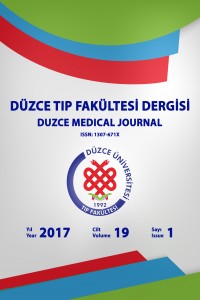Tıp Eğitiminin Sosyal Yaşama Etkisi: Karadeniz Teknik Üniversitesi Tıp Fakültesi Dönem 4 Öğrencileri
Abstract
Amaç: Bu çalışmada tıp eğitiminin öğrencilerin sosyal yaşamları üzerinde oluşturduğu etkilerle ilgili algıları, sosyalleşme sürecini etkileyen diğer faktörler, bu sürecin zaman içerisindeki değişimi ve bu değişikliğin sebeplerini ortaya koymak amaçlanmıştır.
Gereç ve Yöntemler: Tanımlayıcı tipte olan çalışma Karadeniz Teknik Üniversitesi Tıp Fakültesinde yapılmıştır. Çalışmaya ilgili fakültede öğrenim görmekte olan 208 dönem 4 öğrencisi katılmıştır. Çalışmanın verileri 21-25 Ekim 2013 tarihleri arasında toplanmıştır. Veri toplama aracı olarak 24 sorudan oluşan, araştırmacılar tarafından geliştirilen, tıp eğitiminin sosyal hayata etkisini değerlendiren bir anket formu kullanılmıştır. Öğrencilerin sosyal etkinlik katılım sıklığını ölçen bir tablo kullanılarak sosyal etkinlik puanları hesaplanmıştır.
Bulgular: Araştırmaya katılan öğrencilerin %78,4’ü tıp fakültesine başladıklarından bu yana hobilerine ayırdıkları zamanın azaldığını belirtmiştir. Hobilerine ayırdıkları zamanın azaldığını belirten öğrencilerin %88,8’i buna sebep olarak okul ders saatlerini, %70,7’si ise kendi ders çalışma saatlerini göstermiştir. Öğrencilerin %47,1’i üniversiteye başladığından beri arkadaş sayısının arttığını belirtirken, %22,1’i azaldığını belirtmektedir. Ayrıca erkek öğrencilerin kız öğrencilerden daha fazla üniversite kulüplerine katılım gösterdiği (p<0,001), evde kalan öğrencilerin ise sosyal etkinliklere daha fazla katıldığı (p=0,031) görülmüştür.
Sonuç: Çalışmada tıp eğitiminin yoğun programının sosyal etkinliklere katılımı sınırladığı belirlenmiştir. Buna göre, ders programlarının grup çalışmalarına katılımı destekleyecek şekilde geliştirilmesi ve üniversite içerisinde sosyal etkinlikler düzenlenerek öğrencilerin bu etkinliklere yönlendirilmesi önerilmektedir.
The Effect of Medical Education on Social Life: Karadeniz Technical University Medical Faculty 4th Grade Students
Abstract
Aim: The aim of this study is to reveal that the perceptions about effects of medical education on social life of students, other factors that affect socialization process, the change of this process in time and reasons for this change.
Material and Methods: This descriptive study was performed in Karadeniz Technical University Medical Faculty. 208 students from 4th grade in this faculty participated the study. The data of this study were collected between 2013 October, 21-25. The questionnaire form consists of 24 questions developed by researchers to evaluate the effect of medical education on social life was used. Social activity scores were calculated using a table measures participation frequency of students to social activities.
Results: 78.4% of the students who participated in the research stated that the time they have spent for hobbies has decreased since they started medical faculty. 88.8% of the students who stated they had less time for their hobbies, showed their school hours as a reason, and 70.7% of them showed their own study hours. While 47.1% of students stated that the number of friends has increased since they started to university, 22.1% of them asserted that number of their friends have decreased. It is also found that male students have participated in university clubs more than female students (p<0.001) and the students have been living at home have joined social activity more (p=0.031).
Conclusion: In this study, it has been determined that the intensive program of medical education limits the participation in social activities. Accordingly, it is suggested that the curriculum should be developed to support participation in group work, and to be directed students to these events by organizing social activities in the university.
Details
| Primary Language | Turkish |
|---|---|
| Subjects | Health Care Administration |
| Journal Section | Research Article |
| Authors | |
| Publication Date | March 31, 2018 |
| Submission Date | October 7, 2016 |
| Published in Issue | Year 2017 Volume: 19 Issue: 1 |
Cite

Duzce Medical Journal is licensed under a Creative Commons Attribution-NonCommercial-NoDerivatives 4.0 International License.


